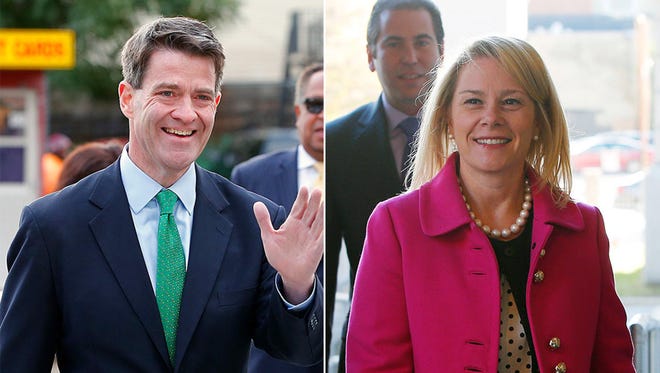Feds: Bridgegate allies 'loyal lieutenants' of Christie

NEWARK, N.J. — A federal prosecutor branded two former allies of New Jersey's governor as “loyal lieutenants” willing to put political goals above public service and to use government property to punish political targets.
That idea formed the center of the government’s closing arguments Friday at the federal trial in Newark of two former allies of Gov. Chris Christie accused of the politically motivated closure of access lanes to the George Washington Bridge.
Defense attorneys were to begin their arguments to jurors before the end of the day and are expected to continue Monday. The plan is for jury deliberations to start Tuesday.
Assistant U.S. Attorney Lee Cortes said the governor’s former deputy chief of staff, Bridget Anne Kelly, and his former top executive appointee at the Port Authority of New York and New Jersey, Bill Baroni, “shared an intense commitment to the political success of Governor Chris Christie.”
Bridgegate prosecutors set for closing arguments
“They saw themselves as his loyal lieutenants who were free to use their government jobs to launch political attacks,” Cortes said.
Kelly and Baroni are accused of conspiring to reduce access to the bridge in September 2013 in Fort Lee, N.J., to punish the town’s mayor for refusing to endorse Christie’s re-election that year. The lane reductions caused gridlock in the town on five mornings, severely delaying commuters, school buses and emergency vehicles.
Lawyers for Baroni and Kelly said David Wildstein, Baroni’s former subordinate at the Port Authority duped their clients, saying the closures were part of a legitimate traffic study.
Wildstein, who pleaded guilty to conspiracy charges last year, was the government’s star witness at the six-week trial, testifying that he played the leading role in the plot aided by Kelly and Baroni.
“David Wildstein acted as the middle man” between Kelly, in the governor’s office, and Baroni at the Port Authority, Cortes said. “Wildstein was the glue.”
Baroni’s and Kelly’s emails and text messages with Wildstein and others formed a large part of the government’s evidence in the case.
Cortes opened his summation by pointing to an iconic phrase, now “frozen in time.”
He read out Kelly’s August 2013 email to Wildstein — “Time for some traffic problems in Fort Lee” — and he played an excerpt from Baroni’s testimony before state legislators in November, 2013, in which Baroni portrayed the lane closures as a poorly implemented traffic study.
Cortes said the traffic study was a premeditated fiction that Kelly, Baroni and Wildstein used as a cover story.
“Did they know there was no traffic study?” Cortes said. “That’s really the central question in the case.”
Judge: Prosecution need not prove motivation behind GWB lane closures
“They knew the lane reductions were punitive,” the prosecutor said. “They agreed from the very beginning to cover that up by calling it a traffic study.”
Throughout the trial, prosecutors, defense attorneys and witnesses depicted Wildstein as a Machiavellian figure who bullied and intimidated Port Authority employees and who reveled in political dirty tricks. Wildstein based all of his actions on the “one constituent rule,” Cortes said, which was that Christie was the only person who mattered.
Baroni and Kelly distanced themselves from Wildstein. But Cortes said the pair knew Wildstein well.
Bridgegate: Aide worried she had been set up to take the fall
“He was about sending political messages, and they agreed to do it with him,” Cortes said.
With so much riding on Wildstein’s testimony, Cortes emphasized to jurors that Wildstein's cooperation agreement with prosecutors depends upon him having told the truth at trial. Prosecutors will request leniency when Wildstein, who faces up to 15 years in jail, is sentenced, according to that agreement.
“Mr Wildstein has a tremendous incentive to tell you the truth,” Cortes said, adding that documents, emails, text messages, phone records and testimony corroborated much of what Wildstein told the court.
Ex-aide: Christie knew of Bridgegate plan before 'traffic problems' email
Although Christie was not charged with any crimes, he has played a central role in the trial.
From the earliest moments of Christie’s first four-year term, prosecutors showed how the governor’s allies used Port Authority assets as a “goody bag” to court endorsements from Democratic officials for the 2013 election. They included tours of the World Trade Center site, then under construction, and gifts of flags that had flown over Ground Zero.
Christie's bipartisan appeal was important to pave the way for a 2016 presidential run, prosecutors said.
5 things we learned about Chris Christie, Bridgegate
The governor’s allies also courted endorsements using invitations to breakfast with Christie at the governor’s mansion in Princeton, N.J., Drumthwacket, or to sit in the governor’s box at New York Giants football games.
Perceived enemies were “frozen out” as punishment, Cortes said. Meetings were canceled and calls to the governor’s office were not returned.
Baroni and Kelly, both 44, are charged with conspiracy, fraud and violating the civil rights of commuters.
Defense tries to pull Christie into lane scandal
Friday's proceedings began with Baroni’s lawyer asking for a mistrial.
Michael Baldassare requested the mistrial based on a time stamp error on text messages that had been introduced as evidence during the trial. Assistant U.S. Attorney David Feder said that because of “a glitch” the time stamps on the text messages shown to the court were one hour early because they did not account for daylight savings time.
U.S. District Judge Susan Wigenton said that the error could be corrected by reading an instruction to the jury informing them about the error. Wigenton denied Baldassare’s request for a mistrial.
Follow Paul Berger on Twitter: @pdberger